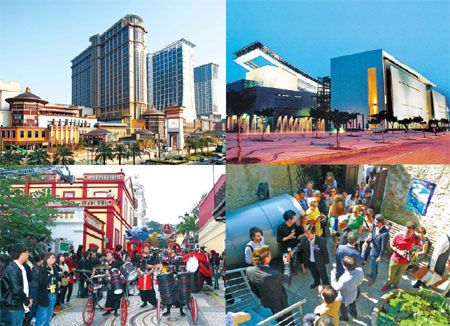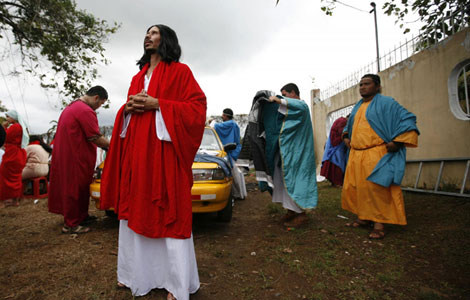 |
|
|
|
|||||||||||
Talking points
 |
|
Clockwise from top left: Sands Cotai Central adds a mass-market casino on reclaimed land. Macao Museum of Art offers a diverse roster of programs to the local community and serves as a platform to show how it views the world. The Macao Latin Parade celebrates its Latin heritage to coincide with the 12th anniversary of the handover by Portugal. Local applicants to the Venice biennale 2011 explore the city's gambling culture through their creative submissions. [Photos Provided to China Daily] |
Communication is still the main problem, not just for the Cultural Affairs Bureau but for any Macao cultural advocate.
Although the average Macao person is aware of the city's annual arts festival in May, American public relations savvy keeps The Venetian and Wynn firmly in the international limelight.
Chan feels that Macao's reputation as Asia's sin city will take time to overcome. "We have a gaming city image," he admits. "Even if we do nothing, this image grows stronger daily.
|
||||
"Cultural events are now on a larger scale and with a wider range," acknowledges Manuel Correia da Silva, founder of multidisciplinary design firm Lines Lab.
"From pop stars at The Venetian to an intimate fado singer in a Chinese heritage building like Mandarin's House. But these are not that well promoted outside of Macao," he says, noting that mainstream events like the Grand Prix and music festival get plenty of coverage.
"But people travel and want to be part of the local scene. We have very good artists and programming, with high quality content and production. It is more about the level of communication, not the lack of funds."
Originally from Portugal, Da Silva lived in Macao as a child and returned after studying industrial design and working in Lisbon.
Along with his partner Clara Brito, they have conceived and produced a number of events including the biannual This is My City focusing on architecture and urbanism, and The L Show in November featuring fashion designers from Portuguese speaking countries. He is currently the curator of two exhibitions slated for Beijing later this year.
"For organizers like me, we want more people to experience our events," Da Silva says. "The economy can only become more sustainable through more diverse tourism offerings."
Beyond the slots
"There will always be people who get off the boat or plane and head straight for a casino," admits Chan Hou-seng, a Macao native who specializes in Chinese art and Macao Museum of Art's director since 1998. "They will stay there until it's time to go home and only see the inside of our casinos.
"We can't do much about that even though we are situated right beside them. Many local people see casinos as a way of making a living but it doesn't affect their lifestyles. Some never even go into them."
Open shortly after the handover, Macao Museum of Art is generously supported by the government and offers a diverse roster of programs. It is also a platform to give the local community a channel to show how it views the world.
The museum's curatorial team of six experts, including Chan, is supported by a staff of 50, which includes full-time restoration artists.
Along with mounting exhibitions, it tries to raise international awareness about Macao culture through support of local artists in international competitions such as the Venice biennale. Last year's biennale applicants explored the city's gambling culture through their creative submissions.
"Macao has a long history of being a cultural center," says Chan. "A lot of different cultures co-exist here. Our motto is: Art is something that you cannot live without.
"We are concerned about young people. They have the desire but not too many avenues for their art. We are now seeing more galleries in warehouses and industrial buildings - this is a natural development, much like a full glass will spill over into whatever is surrounding it.
"Our museum takes an entertainment approach to art; we try not to preach or be too educational. We don't want to add stress to people's daily lives."
Despite the great leaps forward taken by both government departments and the private sector through funding and support, architect Carlos Marreiros feels that much more could be done to put Macao art and culture on the international map.
"Confucius said that we must respect the government and they must protect us," says Marreiros, one of Macao's most prolific heritage preservationists, who has worked on projects including Tap Seac Square and the Portuguese School of Macao.
"It should defend us with pride. But the government isn't proud of its local designers - its sons. For example, the Senado Square decorations during celebrations such as Mid-Autumn Festival, Christmas and Lunar New Year are the same as in other Chinese cities.
They have no uniqueness or identity. The central government respects and supports us - they stress our uniqueness. We should not copy others and the government shouldn't invite imbeciles to decorate our city!"
"Why doesn't the government promote us abroad? Handing out money is the easiest and worst way to do things. The government must spend time to educate its children to fend for themselves," he says.
"Macao wants to be an international city, yet public property like benches, lamp posts and rubbish bins are badly designed. Why not mount a local competition?"
"My personal view," says Stephen Chan, "is that culture is important for citizens to know how to view themselves and view others. How do we fit into our society? To realize our place, we have to take things one step at a time. Like a baby learning to walk, we follow in others' footsteps, first looking to mom and dad, then beyond. Culture cannot happen overnight. Rome wasn't built in a day, but it can be destroyed overnight."
Contact the writer at sundayed@chinadaily.com.cn.

|

|

|

|

|

|